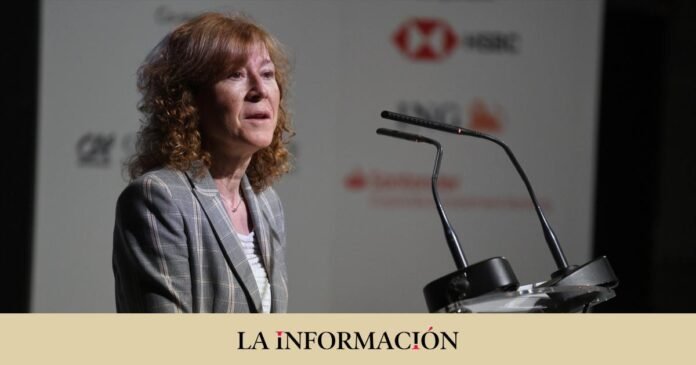In a key week in which the European Central Bank (ECB) will have to juggle so that the markets willingly accept its monetary policy decision – whether it lets itself be carried away by the signs of economic slowdown and chooses not to move rates, as if it gives more value to the resistance to lowering underlying inflation and the strength of the labor market and raises them by another quarter of a point -, the Governing Council of the entity has another key decision on its hands. The main governing body of the entity will decide this Wednesday the name of the successor of the Italian Andrea Enria at the head of the Single Supervisory Mechanism (SSM) for the next five years.
Of the two women running for the position, the vice president of the Bundesbank, Claudia-María Buch, and the deputy governor of the Bank of Spain, Margarita Delgado, the Spanish woman has the approval of the European Parliament which, as Bloomberg recently reported, sent last month July a letter to the issuer describing Delgado as the most qualified to take the reins of the authority that supervises the largest banks in the region. The agency assures that the president of the ECB, Christine Lagarde, chose not to share that letter with the rest of the members of the Governing Council and that her vote would ultimately opt for the German candidate. This would generate obvious friction with the European Parliament, which must approve the entity’s decision.
Enria leaves office in December – for a shine and not relegible – and whoever succeeds him will have the difficult task of supervising the banking sector in an unprecedented situation. The ECB has been forced to carry out the most rapid increase in rates since its creation (it has raised them a total of nine times since July of last year to place its reference rate at 4.25%) and the impact on the economy is already evident. Banks have begun to notice the effects of this increase after having overcome more than a decade of strong restructuring and serious profitability problems.
The difficult task of the new president of the Single Mechanism
And in this context there are already entities that have announced a notable increase in dividends and remuneration to shareholders, amid constant warnings from the central bank to be cautious in their decisions given the risk that the economic situation will worsen in the Eurozone. . and this could lead to an increase in delinquencies. In reality, the main problem for Delgado is that the European Union faces a whole cascade of issues in its main institutions, also on the verge of new elections to the European Parliament that will take place from June 6 to 9 of next year. .
In this ‘armchair dance’ Spain has other key aspirations. The acting first vice president, Nadia Calviño, competes (among others) with the Competition Commissioner, Margrethe Vestager, to become president of the European Investment Bank (EIB), and the problem is that there are already two Spaniards who occupy positions of Relevance in the field of financial supervision: Luis de Guindos, Lagarde’s current right-hand man at the ECB (and whose position as vice president does not expire until 2026) and José Manuel Campa, president of the European Banking Authority (EBA). Meanwhile, Germany has recently lost some key positions at the community level.
A difficult decision on interest rates.
In theory, the decision on the presidency of the SSM should be made public this Thursday after the meeting of an ECB Governing Council that will announce, along with its monetary policy decisions, the new economic perspectives for the region. “We expect the ECB to raise the three official interest rates by 25 basis points,” say Bank of America. Its Chief Economist for Europe, Rubén Segura-Cayuela, emphasizes that, despite how close the decision will be, in general, the latest news supports an increase for several reasons.
First, because of the weaker growth prospects (which according to BofA would rule out a recession for the moment), then because inflation almost (or completely) converges to the target at the end of the forecast period, but is stronger in the short term. Furthermore, due to the small increases in inflation expectations and unit labor costs and given that there is no clear evidence that the underlying inflation has peaked. Eurostat announced that in June the rate that excludes energy and fresh food from its calculation remains at 5.5%. “There is still a good chance that there will be a rise (in rates),” adds Felix Feather, European economic analyst at the manager Open.
From their point of view, a measure of this type could aggravate a recession that is already underway, in light of indicators such as the manufacturing and services PMIs, which suggest that the euro economy could suffer a contraction already in the third. . third quarter “Given that the impact of previous monetary tightening continues to accumulate, and that no relief is in sight, we expect the recession to worsen during the winter,” warns the expert.
It will not be the only aspect to take into account. In fact, Germán García Mellado, fixed income manager at A&G, points out the importance of the outline of the macroeconomic projections made by the issuer. From his point of view, it is very likely that economic growth expectations will be revised downwards, while inflation expectations should not show relevant variations with respect to June, especially in the underlying indicator.

